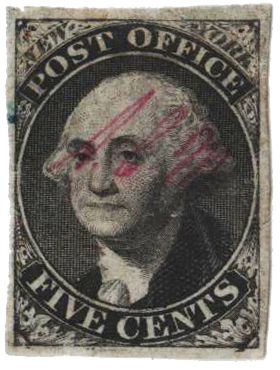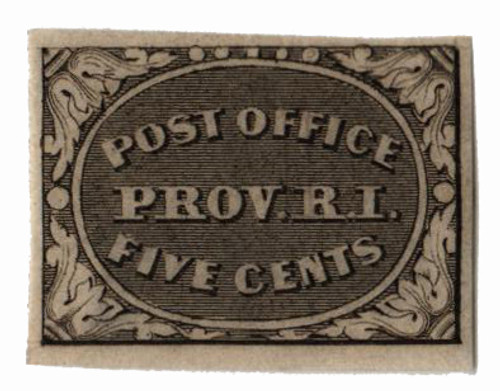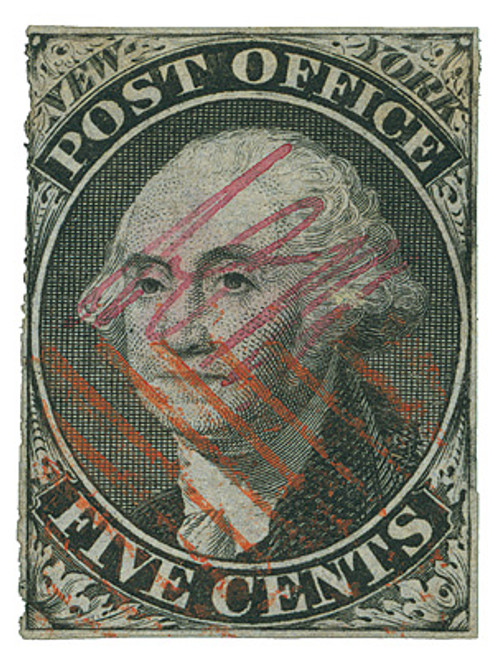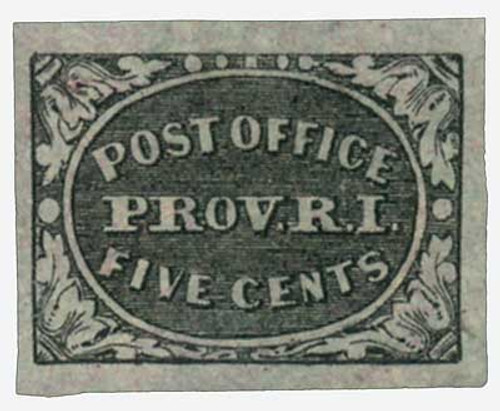
# 10X1 offer - 1846 5¢ Postmaster Provisional, gray-black
Postmaster Provisional Stamp of 1846
Only 2 Available!
On July 1, 1845, the U.S. Congress established uniform postal rates. But the first postage stamps didn’t appear until March 3, 1847, so the Postmaster General authorized Postmaster Provisional stamps to be issued temporarily at twelve different post offices around the country. Postmaster Provisional stamps are among the major rarities of the philatelic world and are sought after by collectors around the globe.
This stamp (Scott #10X1) was first issued on August 24, 1846 in Providence, Rhode Island. At the five-cent rate, it secured delivery of a letter weighing a half-ounce or less for any distance under 300 miles. For a distance over 300 miles, the rate was 10¢. The rate also went up five cents for each additional half ounce.
We Have Only 2 #10X1 Stamps – Order Yours Today
Our limited supply won’t last... so please place your order right away to secure this national treasure for your philatelic holdings.
Postmasters’ Provisional Stamps
In the 1840s, United States postal authorities were carefully watching the world’s reaction to Great Britain’s Penny Black, the first adhesive postage stamp. An adhesive stamp was being considered for use in the US.
Then on March 3, 1845, Congress passed a postal reform act that established uniform nationwide postal rates, effective July 1 of that year. Prior to this, different areas had different postal rates, which made it difficult to determine the postage amount and pre-pay it. As a result, the recipient instead of the sender usually paid the postage. One of the major effects of standardizing postage rates was that stamps could be used to pre-pay postage. However, the government wouldn’t issue its own postage stamps for another two years.
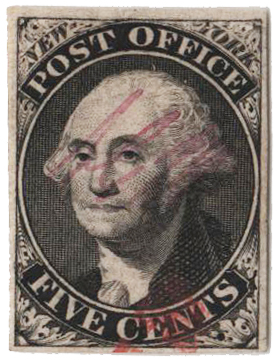
In New York City, Robert H. Morris was appointed postmaster on May 21, 1845. Shortly after taking office he proposed issuing a provisional stamp to meet the new rates, and his idea was accepted. He hired the security printing firm known for its work on banknotes, Rawdon, Wright & Hatch to produce his new stamps. Morris selected a portrait of George Washington by Gilbert Stuart for the stamp’s vignette.
Morris paid about $55 for the first batch of stamps, which he received on June 12. He then sent a copy of the stamp with a letter to postmasters in Boston, Philadelphia, Albany, and Washington to inform them of this new development.
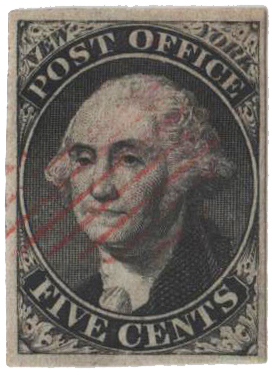
Two weeks after the new postal rates went into effect, Morris issued the first Postmasters’ Provisional stamp on July 14, 1845. Postal customers in New York were quick to adopt the stamp’s use. Stamps weren’t an entirely new concept – private mail carriers had been using them for some time. Morris’ stamp could only be purchased at the city’s post office. And the stamps were “canceled” in red ink by Morris or his assistants. These cancels were their initials – RHM, MM or MMJr (Marcena Monson Jr.) and ACM (Alonzo Castle Monson). Of these cancels, Alonzo’s is the most common and Marcena’s is the rarest.
Baltimore issued its own provisional stamp a day after New York and St. Louis followed suit later that year. Seven other cities would issue their own in 1846.
Postmaster Provisional Stamp of 1846
Only 2 Available!
On July 1, 1845, the U.S. Congress established uniform postal rates. But the first postage stamps didn’t appear until March 3, 1847, so the Postmaster General authorized Postmaster Provisional stamps to be issued temporarily at twelve different post offices around the country. Postmaster Provisional stamps are among the major rarities of the philatelic world and are sought after by collectors around the globe.
This stamp (Scott #10X1) was first issued on August 24, 1846 in Providence, Rhode Island. At the five-cent rate, it secured delivery of a letter weighing a half-ounce or less for any distance under 300 miles. For a distance over 300 miles, the rate was 10¢. The rate also went up five cents for each additional half ounce.
We Have Only 2 #10X1 Stamps – Order Yours Today
Our limited supply won’t last... so please place your order right away to secure this national treasure for your philatelic holdings.
Postmasters’ Provisional Stamps
In the 1840s, United States postal authorities were carefully watching the world’s reaction to Great Britain’s Penny Black, the first adhesive postage stamp. An adhesive stamp was being considered for use in the US.
Then on March 3, 1845, Congress passed a postal reform act that established uniform nationwide postal rates, effective July 1 of that year. Prior to this, different areas had different postal rates, which made it difficult to determine the postage amount and pre-pay it. As a result, the recipient instead of the sender usually paid the postage. One of the major effects of standardizing postage rates was that stamps could be used to pre-pay postage. However, the government wouldn’t issue its own postage stamps for another two years.

In New York City, Robert H. Morris was appointed postmaster on May 21, 1845. Shortly after taking office he proposed issuing a provisional stamp to meet the new rates, and his idea was accepted. He hired the security printing firm known for its work on banknotes, Rawdon, Wright & Hatch to produce his new stamps. Morris selected a portrait of George Washington by Gilbert Stuart for the stamp’s vignette.
Morris paid about $55 for the first batch of stamps, which he received on June 12. He then sent a copy of the stamp with a letter to postmasters in Boston, Philadelphia, Albany, and Washington to inform them of this new development.

Two weeks after the new postal rates went into effect, Morris issued the first Postmasters’ Provisional stamp on July 14, 1845. Postal customers in New York were quick to adopt the stamp’s use. Stamps weren’t an entirely new concept – private mail carriers had been using them for some time. Morris’ stamp could only be purchased at the city’s post office. And the stamps were “canceled” in red ink by Morris or his assistants. These cancels were their initials – RHM, MM or MMJr (Marcena Monson Jr.) and ACM (Alonzo Castle Monson). Of these cancels, Alonzo’s is the most common and Marcena’s is the rarest.
Baltimore issued its own provisional stamp a day after New York and St. Louis followed suit later that year. Seven other cities would issue their own in 1846.







